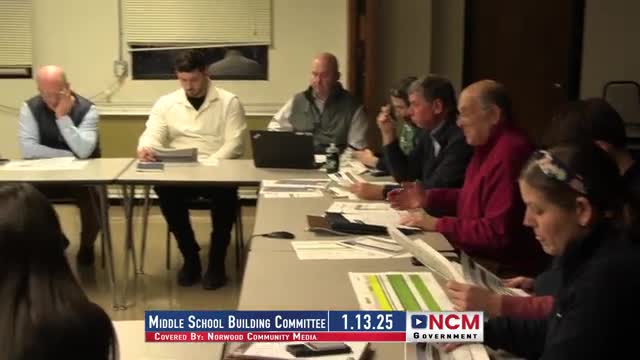Town finance presentation: Norwood middle‑school project tracking with committed budget and possible end‑of‑project surplus; turf and reappropriation options to
Get AI-powered insights, summaries, and transcripts
Subscribe
Summary
Tony Mazzuco, presenting project finances to the Bridal School Building Committee on Jan. 13, said the middle‑school project is roughly 91% committed against a $147.9 million budget and that, after MSBA reimbursements and pending close‑out work, the town may end the project with a modest surplus.
Tony Mazzuco (presenting for project finance staff) told the Bridal School Building Committee on Jan. 13 that the project budget, updated through December and inclusive of the invoices approved at the meeting, shows roughly $136,327,000 committed of a $147,900,000 budget (approximately 91% committed) and that the project is tracking with those commitments.
Mazzuco said staff have received MSBA reimbursement through Request No. 35/36, with the total received reported as $33,711,554; reimbursements for the subsequent requests (numbers 37 and 38) remained pending at the time of the meeting. He said the project team is tracking potential remaining cost risks — notably hazardous‑material abatement during demolition of the existing building and the unknowns that arise when final site work and existing building demolition occur — and that contingencies were included in project budgeting.
Mazzuco told the committee that the town locked in borrowing earlier in the market cycle, which reduced interest‑rate risk; he said decisions to issue bond anticipation notes or stagger borrowing would have increased long‑term borrowing costs. He also noted the towns can refinance municipal bonds after roughly 10 years.
On the question of a possible end‑of‑project surplus, Mazzuco said the MSBA reimbursement change reduced the cushion and that any surplus bond proceeds would be subject to the town’s appropriation and ballot processes: re‑appropriation of unspent bond‑proceeds under a debt exclusion requires administrative recommendation, Select Board and School Committee review, town meeting approval and, where applicable, a ballot vote. He said the committee would not itself re‑appropriate such funds; that process follows town‑level procedures and can take 18 months to two years before final action.
Committee members discussed potential uses for surplus funds if they exist. Several members said items such as an additional turf field or capital set‑asides for building maintenance are possibilities but would need robust vetting. A committee member suggested adding sewn‑in lines for girls and boys lacrosse and field hockey to one turf field; staff said that was easy to add and could be accomplished while contractors were mobilized for related turf work. Committee members emphasized that any larger additions not included in the original project design would need public vetting and would likely require town‑level approval before proceeding.
Jeff O'Neil, identified in the meeting as the town director of finance, clarified that interest earned on borrowed funds is treated as general‑fund revenue unless specifically restricted; he and Mazzuco said use of any surplus bond proceeds or interest proceeds would follow the town’s appropriation process.
Mazzuco closed by listing timing risks tied to commissioning, demolition of the old building and field construction; he and project staff said they expect to have a clearer close‑out accounting in the months after occupancy and that any re‑appropriation decisions would be subject to the town’s legal and administrative process.
